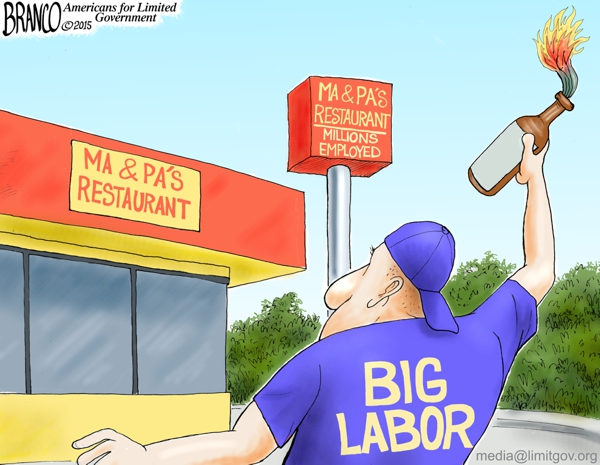By Dustin Howard
Here is one defund Congress might want to look at in the upcoming omnibus spending bill for the remainder of Fiscal Year 2016: Stopping the National Labor Relations Board’s (NLRB) war on the franchise business model.
In business, predictability is usually a prerequisite for growth. The business that can successfully project what its costs are should know how much revenue it will need to generate in order to remain profitable and survive.
Because of disruptive rulings like the August 2015 decision from the NLRB redefining what constitutes a so-called joint employer under the National Labor Relations Act, job creating businesses are being placed in the insecure position of reconsidering whether they are in arrangements that will keep them afloat.
In doing so, the NLRB upended decades old precedent. If a business contracts a service out to another business, the former is now by definition a joint employer subject to the law’s requirements.
Suppose one owns a fast food franchise, they are now open to the same liabilities and obligations as if a contractor were an employee on the payroll. This opens the door to massive increases of unionization among franchises, moving closer to the day when all forms of contractors will have the power to collectively bargain with the franchiser as well as the franchisee.
So a fast food restaurant as an example could ask if this will wreak havoc in their organization. It is likely, as the consumers that are only willing to purchase a product at a given price would likely purchase less if labor costs were to spike, and with them prices, in a precipitous manner; or if striking employees were to be replaced in labor disputes. In an economy already made fragile by so many other harmful regulations and taxes, could this push out companies on the edge, and hurt consumers in the process?
Or, more likely, those employees will just be laid off and replaced with automated machines to serve food and handle payment.
The Obama administration, or certainly its NLRB appointees, could care less. In their world, it is better for dues paying union membership to support Democrats financially than it is for businesses to create jobs, and for entry level employees to learn valuable skills that increase the value of their labor. Disruption is a speed bump on the way to progress, regardless of those who are ran over in the process.
Further, the objective of this ruling is to break the entire franchise system, opening up millions of positions to Democrat labor interests, enabling them to draw capital away from job creation into union coffers. The reality of the ruling is that it impacts any operation that operates as a franchise, be it a retail store or a restaurant. The impact may prove to be vast, and threaten untold numbers of jobs and businesses.
This perverse interpretation does not have to stand. Congress still has time to act, and can block the implementation of the rule to restore the predictability that existed before NLRB’s partisan ruling. Both germane committees in the House and Senate, under Rep. Tom Cole (R-Okla.) and Sen. Roy Blunt (R-Mo.) have acted in concert with language to delay implementation until other action can be taken. Their committees’ work must advance through the omnibus spending bill to assure success.
As it stands, little prevents the labor movement from paralyzing entire industries. When such disruptions are themselves predictable, the only predictable outcome is that jobs will be lost and we will all be forced to pay for it. Congress must act to enable job creators, and not empower the unholy alliance between the administrative state and big labor.
Dustin Howard is a contributing editor at the Americans for Limited Government.







